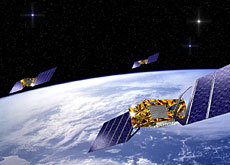
Swiss consider joining space project

European nations are developing their own satellite radio navigation system to compete with the American Global Positioning System (GPS).
Switzerland is debating whether to make a belated appearance in the Galileo project, which could generate millions in revenues and offer a vast range of applications.
But time is running out for the Swiss, who have to decide by 2006 whether to join.
A constellation of 30 European satellites and ground stations is due to be dotted around the Earth by 2008, with a range of 20,000 kilometres. The network will enable car drivers, mobile phone users and ship captains to determine their exact position to within one metre.
In road and rail transport, it will make it possible to predict and manage journey times.
With an estimated cost of €3.5 billion (SFr5.5 billion), Galileo is one of the biggest projects ever launched by the European Union and the European Space Agency (ESA).
Although a member of ESA, Switzerland has been slow to express an interest in Galileo.
US dependency
Galileo is an attempt by the Europeans to shed their dependency on the United States-made GPS which, aside from a smaller Russian system, is currently the only service offering positioning information.
There are some notable limitations to the GPS, which is controlled by the Pentagon.
The US defence ministry has the right to interrupt information transmission at any time and can change the signals for strategic reasons, which it did during the Gulf and Kosovo wars.
Even in times of peace, the exact positioning signals remain the exclusive domain of the US military.
Civilians can determine their position only to within 50 metres, which is too imprecise for some applications such as flight path navigation.
Swiss donation
Unlike the American model, the European system will be controlled by a civilian body and will not suffer from signal restrictions, allowing it to give highly precise positioning in time and space.
This is one of the reasons why the project has stirred Swiss interest. Switzerland has already pledged SFr35 million towards the system, though a long-term involvement would require a far greater financial investment.
The cabinet in December asked the Federal Office for Transport to provide alternative scenarios about the role Switzerland could play in the project.
A preliminary meeting with EU experts has already taken place, according to the Federal Roads Office, which is leading initial talks together with the Swiss Office for Integration.
According to Adrian Sollberger of the Integration Office, Switzerland has not yet made up its mind about getting involved. “Switzerland isn’t under time pressure to decide,” he told swissinfo.
Lucrative
From an economic point of view, Swiss involvement would definitely make sense. Satellite navigation is seen as a key technology of the future with a vast amount of uses.
In a few years’ time, most cars will be equipped with a navigation system. Many mobile phones will also be able to receive the satellite signals to deliver exact positioning data. Possible applications might include a tracking device for children to enable parents to keep tabs on their location.
A study commissioned by the EU estimates that Galileo would have 1.5 billion direct and indirect users. It is expected to create 140,000 jobs and generate annual revenues of €9 billion.
Switzerland’s high tech sector also wants a slice of the cake. The Neuchâtel Observatory and its spin-off, Firma Temex, have already clinched a contract to manufacture atomic clocks for use in space.
Other Swiss companies would doubtless reap the benefits of Swiss participation in the Galileo project.
Switzerland would also be rewarded for joining at a later stage, as the commercial use of the navigation system will be far cheaper for participating nations than for outsiders.
Military application
Despite being controlled by civilians, Brussels has not ruled out military applications for Galileo.
The European Commission recently announced that its space projects would be closely linked to a possible EU security and defence force. Galileo would enable EU forces to monitor the movement of troops and munitions.
“Galileo’s military dimensions are of huge relevance to Switzerland,” says Sollberger. A key sticking point, he says, is whether military use would contravene Swiss neutrality.
swissinfo, Katrin Holenstein (translation: Vanessa Mock)
The Galileo satellite radio navigation system is an initiative of the European Union and the European Space Agency.
The project is expected to cost €3.5 billion (SFr5.5 billion) and to be in place by 2008.
Switzerland has pledged SFr35 million towards the system.

In compliance with the JTI standards
More: SWI swissinfo.ch certified by the Journalism Trust Initiative


























You can find an overview of ongoing debates with our journalists here . Please join us!
If you want to start a conversation about a topic raised in this article or want to report factual errors, email us at english@swissinfo.ch.